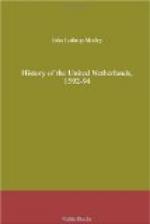This was Verdugo’s first and last attempt to relieve the city. He had seen enough of the young prince’s tactics and had no further wish to break his teeth against those scientific entrenchments. The Spaniards at last, whether they wore their shirts inside or outside their doublets, could no longer handle the Dutchmen at pleasure. That people of butter, as the iron duke of Alva was fond of calling the Netherlanders, were grown harder with the pressure of a twenty-five years’ war.
Five days after the sanguinary ‘camiciata’ the besieged offered to capitulate. The trumpet at which the proud Van den Berg had hinted for six months later arrived on the 12th September. Maurice was glad to get his town. His “little soldiers” did not insist, as the Spaniards and Italians were used to do in the good old days, on unlimited murder, rape, and fire, as the natural solace and reward of their labours in the trenches. Civilization had made some progress, at least in the Netherlands. Maurice granted good terms, such as he had been in the habit of conceding to all captured towns. Van den Berg was courteously received by his cousins, as he rode forth from the place at the head of what remained of his garrison, five hundred in number, with colours flying, matches burning, bullet in mouth, and with all their arms and baggage except artillery and ammunition, and the heroic little Lewis, notwithstanding the wound in his belly, got on horseback and greeted him with a cousinly welcome in the camp.
The city was a most important acquisition, as already sufficiently set forth, but Queen Elizabeth, much misinformed on this occasion, was inclined to undervalue it. She wrote accordingly to the States, reproaching them for using all that artillery and that royal force against a mere castle and earthheap, instead of attempting some considerable capital, or going in force to the relief of Brittany. The day was to come when she would acknowledge the advantage of not leaving this earth-heap in the hands of the Spaniard. Meantime, Prince Maurice— the season being so far advanced—gave the world no further practical lessons in the engineering science, and sent his troops into winter quarters.




